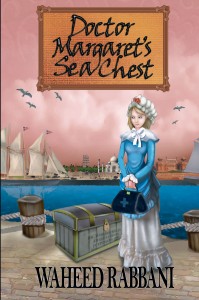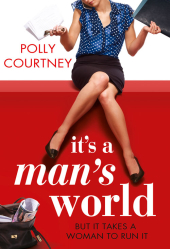Podcast: Download (Duration: 38:26 ? 23.7MB)
I love talking to people who do things differently than the average author, and Polly Courtney has loads to share in today?s show.
 Polly famously split with her publishers over misleading branding for her books, plus she successfully navigates the world of traditional media and PR.
Polly famously split with her publishers over misleading branding for her books, plus she successfully navigates the world of traditional media and PR.
In the intro I talk about my latest edits on Exodus and the novella business model, plus my plans for NaNoWriMo and mainly for non-fiction authors, How To Turn Your Ideas Into Cash (free videos & webinar available now)
The podcast is now accepting sponsorship per episode if you are interested in promoting your book in this way.
 Today?s Podcast Sponsor: Dr Margaret?s Sea Chest by Waheed Rabbani
Today?s Podcast Sponsor: Dr Margaret?s Sea Chest by Waheed Rabbani
The Azadi Trilogy covers India?s freedom from the British Raj, seen through the eyes of an American lady doctor and her descendents. In Book I, Doctor Margaret, marries her Canadian cousin and serves in the 1854 Crimean war, where there they have to face not only hardships of battles, but also other conflicts, before Margaret can continue on her journey to India.
Doctor Margaret?s Sea Chest is available in print and ebook on Amazon.com (24 reviews, 4.5 star average) and other ebook stores, or Waheed Rabbani?s website.
Interview with Polly Courtney
 Polly Courtney is the author of 6 novels including ?It?s A Man?s World?. She is also a media commentator, appearing on UK TV and in well-known magazines and newspapers.
Polly Courtney is the author of 6 novels including ?It?s A Man?s World?. She is also a media commentator, appearing on UK TV and in well-known magazines and newspapers.
From self-publishing to traditional 3 book deal and back to self-publishing again ?
- How Polly got started as an engineer and then went into the city of London as an investment banker. But the city was not all it seemed so Polly left and wrote a book about her experiences ?Golden Handcuffs?. At that time, Polly got an agent and tried the traditional route. She was being pushed down the chick-lit route so she self-published, which in 2006 wasn?t quite so acceptable. She sold the first print run of 10,000 copies in the first 3 months and got a lot of press coverage. Her success in self-publishing got her a book deal with Harper Collins.
- Polly wrote 3 books with Harper Collins and then on the launch of ?It?s a Man?s World? she was in the press for splitting with the publisher for marketing her as chick lit when she, as the author, didn?t believe the marketing captured what the book was really about. The publisher?s imprint was commercial and focused on packaging based on trends rather than content. Polly found this increasingly frustrating as she didn?t feel it fitted with her own brand. She had no say over title and cover design e.g. The Fame Factor to capitalize on the success of the X Factor. Polly felt her work was being mis-marketed and was fooling the readers which is disappointing. It?s also a lesson about the press as various angles were taken on the story that didn?t reveal the whole truth.
- On independent authors and the author as a business. Polly believes in being the director of the various elements of the book, which is the independent author approach. Polly has books out under Harper Collins but is increasingly moving back to self-publishing, and she does want to buy the rights back when the books go out of print.
On literary snobbery in the UK publishing environment
- How that attitude has affected me personally, and I ask Polly how she broke through the snobbery and self-published back when it wasn?t acceptable. Basically she didn?t tell people it was self-published and people just assumed it traditionally published. Now it?s seen as a pro-active choice so it?s great to shout about it. Back then, she felt strongly that they was a market for the book and confidently pursued her dream.
- The importance of confidence. Is it fake it til you make it. But also involve a lot of people along the way. Writing doesn?t have to be isolating, you can involve others. People and collaboration are the key.
On using traditional media and PR
- Polly has had a lot of traditional media exposure and PR, and she is always thinking of how she can pitch ideas to latest stories. Whatever stage the book is at, she is keeping an eye on the media and how the themes of her book will fit with stories. She pitches TV and magazines with ideas related to those themes because the media are looking for people who can talk intelligently on subjects. Features writers are always looking for news, whereas book reviewers are overwhelmed, so it can be a more effective approach.
- Tips for getting media attention. It can be a ?cold? contact, as in Polly will approach a journalist who has written on a specific topic before even though she doesn?t have relationships. It can also be a referral from people she has worked with in the past. Follow-up every lead e.g. a random small magazine may connect you to something else, so say ?yes? first.
- Does traditional media sell books? How I did national TV, radio and newspapers but made no sales. It comes down to what the book is and what the target readership is. New media/ online can be targeted to a specific audience so you will get a better response. Mainstream PR is not a specific audience and is more about brand image. Think a lot about who your core market is and try to target niches.
- Finding a hook for media is easier for non-fiction. But for fiction authors, think about the themes and the hooks within them. Polly has written around themes that resonate with different groups. Genre writers can focus in marketing to those specific groups.
- Polly blends online marketing with traditional marketing now. Her sales of print vs ebooks are split reasonably evenly. She now uses Facebook, Twitter and YouTube as well as email marketing and face to face chats with people, as well as speaking and traditional media.
- Polly does think about themes and PR hooks before she starts writing, but other authors might cringe at this, so It depends on the author and perhaps, how business-focused they are. If you do get a publishing deal though, you do have to think about marketing and obviously self-publishers have to market their own books.
- You don?t need media training. Polly has just picked up tips along the way. A lot of her knowledge is from writing and observing e.g. it?s different to write for Grazia than it is for the Guardian. It?s copycat and common-sense, learning all the way and confidence. Don?t be afraid of journalists and producers. They may ignore you but sometimes it?s well worth it. Always say ?yes? and work out how to do it later. It is time-consuming to research and pitch to newspapers and magazines with 9/10 rejections, but the one time can be worth doing.
You can find Polly at PollyCourtney.com, her books on Amazon & other bookstores and on twitter @pollycourtney
Thanks for coming back to the blog. To get the latest on writing, publishing, internet sales and marketing for your book, please subscribe to receive email updates from The Creative Penn blog. Just click here and enter your email address to subscribe.. Thanks for visiting!
Related posts:
- Traditional Publishing And Self-Publishing Are Not Mutually Exclusive Tweet I?m getting a little weary of the hype that...
- Secrets Of Traditional And Indie Publishing With NY Times Bestselling Author CJ Lyons Tweet We all want to learn from professional authors who...
- Moving From Traditional Publishing To Indie With Orna Ross Tweet We all need mentors, people who inspire us and...
- Book Marketing: Why I Gave Up Trying to Build a Big Social Media Following Tweet I am a huge fan of Twitter and an...
- Traditional Publishing: The Query And The Funnel Tweet I am currently in the air flying down under...
Related posts brought to you by Yet Another Related Posts Plugin.
Source: http://www.thecreativepenn.com/2012/10/17/publishing-choices-pr-polly-courtney/
Tropical Storm Isaac path Hurricane Katrina Hurricane Isaac Path Isaac Hurricane earthquake san diego Hurricane Isaac Sam Claflin
No comments:
Post a Comment